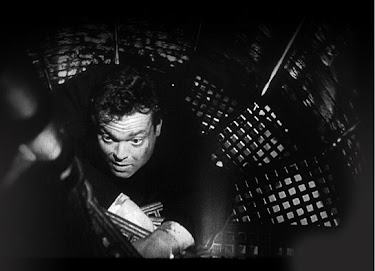Written by: David Goodis (novel), Delmer Daves (screenplay)
Starring: Humphrey Bogart, Lauren Bacall, Bruce Bennett, Agnes Moorehead, Tom D'Andrea, Clifton Young, Rory Mallinson, Houseley Stevenson, Douglas Kennedy
Dark Passage (1947) opens like a first-person shooter video game, the camera taking the main protagonist's point-of-view, and generally restricting the audience to what Humphrey Bogart can see. However, in choosing to utilise this unusual technique, director Delmer Daves does something very dangerous, almost suicidal: he doesn't show us Humphrey Bogart! This was not the first major use of the first-person perspective; Rouben Mamoulian tried it for the first five minutes of Dr. Jekyll and Mr. Hyde (1931) and, even more impressively, Robert Montgomery constructed an entire detective story from Philip Marlowe's perspective in Lady in the Lake (1947). But Dark Passage feels more audacious than both of these, most of all because Daves chose, for the entire opening half of his picture, to obscure the face of Hollywood's most celebrated and recognised star. When studio head Jack Warner asked for just another Bogart-Bacall picture, he sure as hell didn't expect this. It was a gamble that ultimately failed (financially, that is), but I can respect any filmmaker who's willing to mix things up a bit.
The film noir style is well-known for its regular decline into the creepy, surreal and absurd side of human existence. Writer David Goodis originally adapted the film's screenplay from his own 1946 novel, though Daves was subsequently commissioned to satisfactorily rewrite it. Dark Passage follows escaped criminal Vincent Parry (Bogart), who claims to be innocent of his wife's murder, and who uses his tentative freedom to try to clear his name. After a sympathetic taxi driver (Tom D'Andrea) points Vincent in the direction of a demented plastic surgeon (Houseley Stevenson), he eventually accepts the accommodation of a mysterious young woman, Irene Jansen (Lauren Bacall), who staunchly believes in his innocence. The supporting cast really shines here, particularly Clifton Young as a weaselly small-time crook who hatches an ambitious scheme to blackmail Irene for $60,000. Uniquely, much of the filming took place on-location in San Francisco, California, with the outdoor settings adding a vitality to the photography that is rather refreshing.
 The chemistry between Bogart and Bacall doesn't quite sizzle here as it usually does, and that our hero spends much of his time behind the camera certainly doesn't help. The film is strongest when it spends time with its supporting characters, which makes me think that Dark Passage might have been a better film had it been cast with relative unknowns. Daves obviously produced the film with one eye on his prized romantic couple, and the accompanying marketing opportunities, and, consequently, the story often tries too hard to create a memorable romance. Though the plot begins to meander towards the predictable in its final reel, the opening acts prove especially engrossing, not only because of the intriguing camera gimmick, but because we absolutely have no idea where this unusual story, with its cast of incredibly offbeat characters, is trying to lead us. It's also rewarding to try and guess how long Jack Warner could tolerate not seeing Humphrey Bogart's face until he threatened to shoot somebody; I think we can safely estimate this figure to sit just beyond one hour.
The chemistry between Bogart and Bacall doesn't quite sizzle here as it usually does, and that our hero spends much of his time behind the camera certainly doesn't help. The film is strongest when it spends time with its supporting characters, which makes me think that Dark Passage might have been a better film had it been cast with relative unknowns. Daves obviously produced the film with one eye on his prized romantic couple, and the accompanying marketing opportunities, and, consequently, the story often tries too hard to create a memorable romance. Though the plot begins to meander towards the predictable in its final reel, the opening acts prove especially engrossing, not only because of the intriguing camera gimmick, but because we absolutely have no idea where this unusual story, with its cast of incredibly offbeat characters, is trying to lead us. It's also rewarding to try and guess how long Jack Warner could tolerate not seeing Humphrey Bogart's face until he threatened to shoot somebody; I think we can safely estimate this figure to sit just beyond one hour.8/10
Currently my #4 film from 1947:
1) The Ghost and Mrs. Muir (Joseph L. Mankiewicz)
2) Monsieur Verdoux (Charles Chaplin)
3) Out of the Past (Jacques Tourneur) *
4) Dark Passage (Delmer Daves) *
5) The Lady from Shanghai (Orson Welles) *






_poster.jpg)


No comments:
Post a Comment